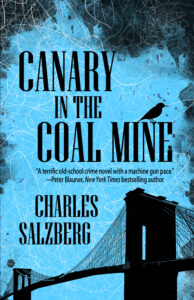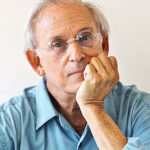 Author Charles Salzberg is back with a new interview. Today, he’s chatting with me about his new noir detective novel, Canary in the Coal Mine.
Author Charles Salzberg is back with a new interview. Today, he’s chatting with me about his new noir detective novel, Canary in the Coal Mine.
Charles visited a few years back and we talked about his crime suspense, Second Story Man.
Bio:
Charles Salzberg is a former magazine journalist whose work has appeared in New York magazine, GQ, The New York Times, Redbook and other periodicals; and nonfiction book writer of among others Soupy Sez: My Zany Life and Times, with Soupy Sales, From Set Shot to Slam Dunk, an oral history of the NBA. He is the author of the Shamus Award nominated Swann’s Last Song, Devil in the Hole, named as one of the best crime novels of 2013 by Suspense magazine, Second Story Man, winner of the Beverly Hills Book Award and also nominated for a Shamus Award and the David Award. He teaches writing in New York City for the New York Writers Workshop, where he is a Founding Member. He is also on the Board of PrisonWrites and a former Board member of MWA-NY.
Welcome back to Reviews and Interviews, Charles. Please tell us about your newest release.
Canary in the Coal Mine introduces half-Italian, half-Jewish, New York private investigator Pete Fortunato who not only has serious anger management issues but also suffers from insomnia. Fortunato, who works out of a friend’s real estate office, is hired by a beautiful young woman to find her missing husband, dead or alive. Ultimately, this search involves Fortunato with the deadly and violent Albanian mob and the search for a large sum of money stolen from the mob by the very man he’s been hired to find. His quest takes him out of New York and down to Texas and New Orleans.
What inspired you to write this book?
I don’t write conventional murder mysteries, and I rarely include violence in any of my novels, so I wanted to challenge myself by creating a throwback character in the tradition of the hard-boiled detective who’s not afraid to use force when necessary. It also gave me the opportunity to write what might be considered more of a murder mystery, since there is a death involved.
Excerpt from Canary in the Coal Mine:
This Could Be the Start of Something Big
I wake up with a bad taste in my mouth.
It’s not the first time this has happened and it won’t be the last. I like to think of it as my personal canary in the coalmine. That taste usually means trouble on the horizon. Sometimes it’s someone else’s trouble. Sometimes it’s mine. Sometimes it’s both. Those are the times I have to watch out for.
Once I rouse myself from bed—it’s never easy when I’ve had a rough night—I launch into my usual routine. Shower, shave, brush my teeth, which are my pride and joy, especially the two phony teeth implanted on the left side that replaced those knocked out in a particularly vicious fight I did not start, at least that’s the way I see it. It was a pickup softball game. A guy came into second hard and late and spiked my shortstop in the leg. It took eleven stitches to close the wound. Someone had to do something and as usual I was the first one out there and the one who threw the first punch. That’s the drill for most of my fights. I never start them, well, hardly ever because being provoked by someone else doesn’t count. But when I do throw a punch I have good reason. The fights usually end with me bloodied but unbowed. You might say I have a temper but I prefer to think of it as a short fuse and an obsession with justice. No one gets away with anything on my watch. I win a few. I lose a few. There’s always a price to pay and I always make my point. But let’s face it there are no real winners when it comes to violence. Everyone, even the winner, loses something. That’s just the way it goes.
Lately I’ve had to curb the physical stuff. Now that I’m into my forties things are starting to fall apart. They say it’s the legs that go first but in my case, it is my shoulder. I displaced it throwing a punch to someone who deserved it, someone who’d had a little too much to drink and insulted a woman I was with. The embarrassing part was I missed. Turns out that’s what did the damage. Missing my target. I had my arm in a sling for almost a month. It’s pretty much healed now though I sometimes feel it in damp weather. The doc warned me it could go out again any time. “Try to stay out of fights, Pete,” he said, then added, “though knowing you that’s not very likely.”
He was right. I’m combative. It’s my nature. I’ve never run away from a fight and I probably never will. I just have to be a little more careful now, which means choosing my battles a little more wisely.
These phony teeth of mine match the others perfectly. A dentist who owed me a favor—I provided him with all the information he needed to divorce his cheating wife and avoid being taken to the cleaners—planted them and swore no one could tell the difference. So far, he’s been right. I like to think those are the only phony things about me. Everything else, for better or worse, is me, all me. I don’t apologize for it. Take me or leave me. I don’t care.”
What’s the next writing project?
My agent is now shopping around a novel called Man on the Run, which is kind of a continuation of the story of one of the main characters of Second Story Man, master burglar Francis Hoyt. I never intended to write a sequel, but I started to get curious as to what happens to Hoyt after Second Story Man ends. I’m also working on a new novel, I don’t even have a title yet that I’m happy with, focusing on a character who has a touch of ESP. When his best friend’s college age daughter turns up missing, this character is asked by his friend to help with the search.
 What is your biggest challenge when writing a new book? (or the biggest challenge with this book)
What is your biggest challenge when writing a new book? (or the biggest challenge with this book)
The biggest challenge is usually to create an interesting, compelling, fully-imagined character who’s thrown into a possibly life-altering situation. The subject and the characters have to interest me, and then it’s my job to create a story that keeps me excited. I think I’m stronger on character than I am on plot, so that’s always a challenge for me—creating an interesting set of facts that takes the reader (and me) somewhere he or she hasn’t been before.
If your novels require research – please talk about the process. Do you do the research first and then write, while you’re writing, after the novel is complete and you need to fill in the gaps?
I’m pretty lazy, so I tend to do as little research as possible. But this doesn’t mean no research at all, just only when necessary. For instance, with Second Story Man, I did pretty extensive research on burglars, how they work, what they’re looking to steal, as well as how alarm systems work and how to bypass them. With Canary in the Coal Mine, I did some research on the Albanian mob. The other thing I like to do is write about places I’ve never been. That often necessitates doing geographical research deep enough so that it appears as if I’m actually familiar with the area. In my first novel, Swann’s Last Song, the book takes place in New York City (where I’ve lived my whole life), Los Angeles (where I’d never been at the time), a part of Mexico I’d never visited, and Berlin, where I’d also never been. To research that novel, I not only interviewed friends who’d been to those places, but I studied maps and read as much as I could about the areas I was writing about. Some of this research I do pretty much before beginning, but since I’m one of those writers who doesn’t plan anything—I have no idea what’s going to happen on the next page, much less the next sentence—I often have to stop and research while I’m in the midst of writing the book.
What’s your writing space like? Do you have a particular spot to write where the muse is more active? Please tell us about it.
I have a second bedroom that I’ve turned into an office/study/guest bedroom. I write on a desktop—for some reason, I don’t like the keyboards on laptops. Alas, I don’t have a muse (at least not one I’m aware of), and to be honest, I don’t even spend that much time actually writing. Fortunately, I’m a very fast typist, about 90 words a minute (the best, most useful class I had to take in junior high school) and I have an ability to focus pretty well once I actually do get myself to sit down and write. But I’m often thinking about the book when I’m away from my “office,” so I’m guessing a lot of the writing takes place subconsciously.
What authors do you enjoy reading within or outside of your genre?
Having been an English major, I’m very fond of a number of American writers: Vladimir Nabokov .(yes, he was Russian, but he actually wrote in English, so I’m counting him here as an American writer), Norman Mailer, Philip Roth, Bernard Malamud and Saul Bellow. But growing up I was a big fan of crime writers like Dashiell Hammett, Raymond Chandler and other classic crime writers. In terms of contemporary crime writers, I’m a big fan of Reed Farrel Coleman, S.A. Cosby, Matt Goldman, Megan Abbott, Tom Straw and Michael Wiley, S. A. Cosby, Steve Russo, Gray Basnight, S.J. Rozan and so many others. Before getting into the crime game, I was a little snobby about those who wrote in this genre. But, having read a ton of stuff once I decided to write a crime novel (I had no intention at all at writing another one, but when Swann’s Last Song was released and it was nominated for a Shamus Award for Best First Novel and I lost, I got a little pissed off and said to myself that I was going to keep writing them until I won something. Then, of course, I was hooked, because I realized that I could write about any subject and fuse it with a “crime” and I was good to go. And as I read, I realized how much good writing there is in the genre, by people like the ones mentioned above.
Anything additional you want to share with the readers today?
Only that if you do wind up picking up a copy of Canary in the Coal Mine, you enjoy it.
Thank you for coming back to Reviews and Interviews!
